Infrastructure
AfDB approves $210m for Nigeria’s Special Agro-Industrial Processing Zones
On Monday, the Board of Directors of the African Development Bank (AfDB) approved a $210m loan to co-finance Phase 1 of Nigeria’s Special Agro-Industrial Processing Zone Programme. This is the one of the AfDB’s most ambitious operations in supporting African agriculture to date. The facility is made of an AfDB loan of $160m along with an Africa Growing Together Fund loan of $50m. It is provided with co-financing from other partners such as the Islamic Development Bank and the International Fund for Agricultural Development, in the amount of $538.05m. Phase of Nigeria’s Special Agro-Industrial Processing Zone Programme targets the states of Cross River, Kaduna, Imo, Kano, Kwara, Ogun, Oyo and the country’s Federal Capital Territory of Abuja. It aims at unlocking the country’s agriculture sector potential by promoting industrialization through the development of strategic crops such as cassava and rice, and beef and dairy livestock. “The project areas account for 19% of Nigeria’s total land mass and will benefit 50.4 million people,” the AfDB said. “The zones are designed to concentrate production, processing, storage, transport and the marketing of commodities – like cotton or maize to increase productivity and competitiveness and reduce logistics costs.” In total, the AfDB plans to establish 18 such zones across Africa as part of its Feed Africa Strategy.
Read more »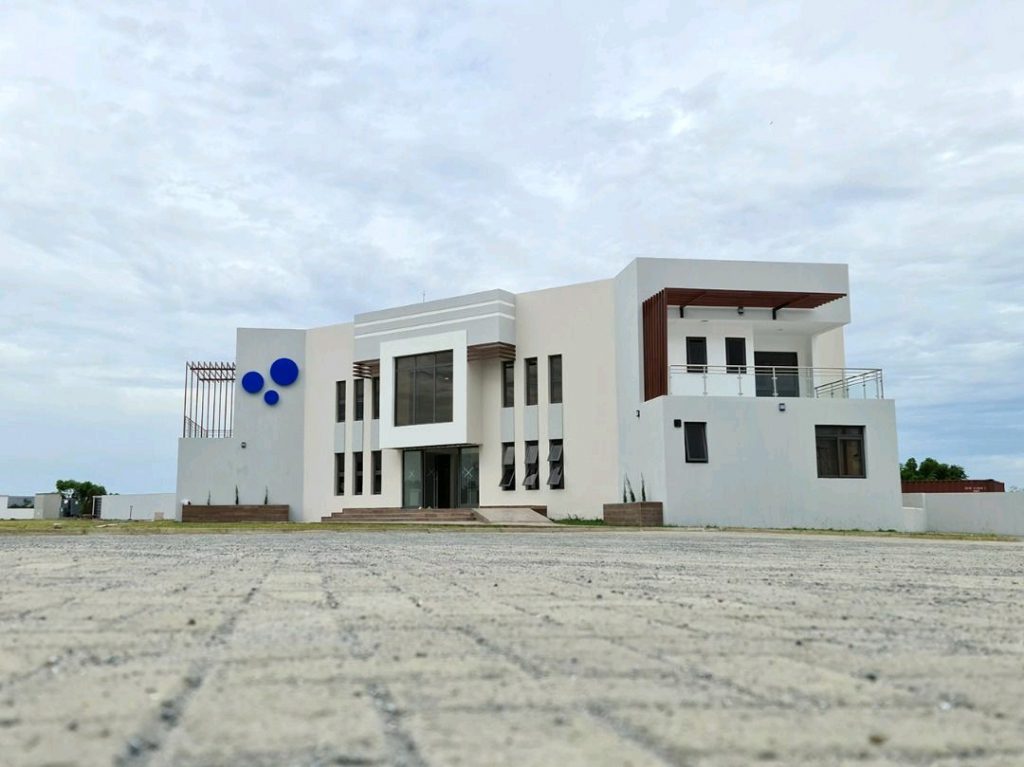
American digital infrastructure company Equinix to acquire MainOne for $320m
Equinix has revealed yesterday its intention to expand into Africa by acquiring African data center and connectivity solutions provider MainOne. The acquisition is valued at $320m and is expected to close in Q1 2022. By acquiring MainOne, Equinix would gain a strong foothold in Nigeria, Ghana and Côte d’Ivoire where MainOne has already built data centers. The Nigeria-based company currently has three operational data centers in West Africa, with an additional facility in Ghana currently under construction. MainOne also owns and operates an extensive submarine network extending 7,000 kilometers from Nigeria to Portugal, as well as 1,200 kilometers of reliable terrestrial fiber network across southern Nigeria. The American company sees the move as its first step towards its long-term strategy of becoming a leading African carrier neutral digital infrastructure company. Under the terms of the transaction, MainOne’s management team, including CEO Funke Opeke, will continue to serve in their respective roles.
Read more »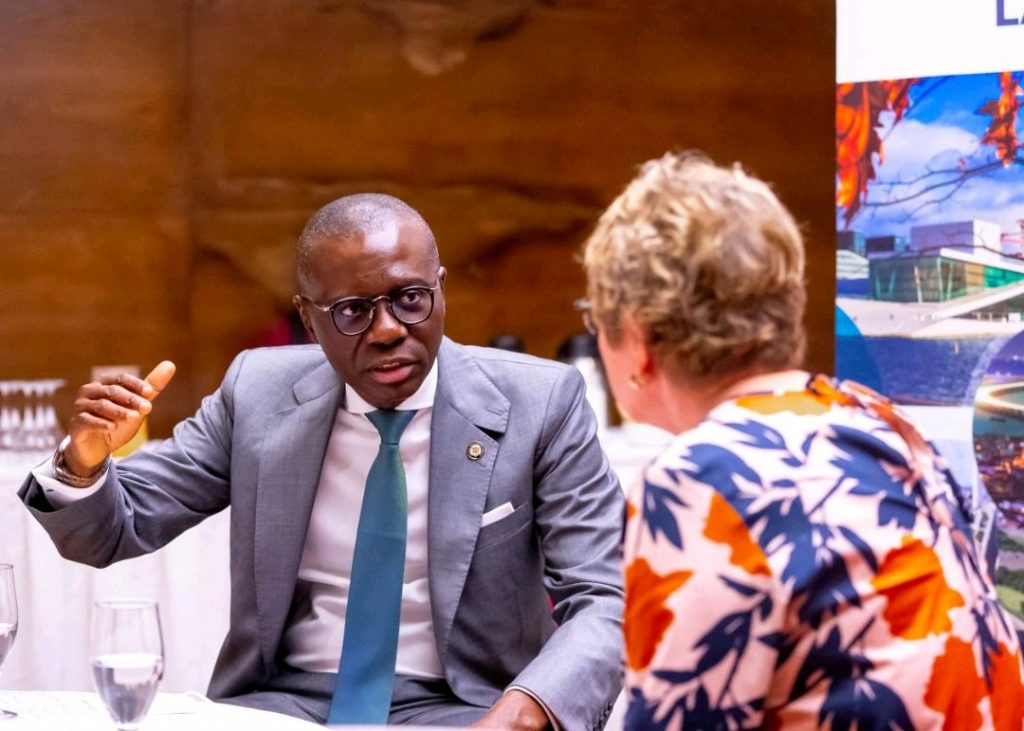
Nordic investors seek to invest into smart city projects across West Africa’s largest commercial city
The Nordic Nigeria Connect just closed in Lagos this week after welcoming delegations of investors from Norway, Denmark, Finland and Sweden. The conference was organized by Nordic countries to present several opportunities across waste and wastewater management, green energy and green transportation solutions across the State of Lagos. More importantly, the week highlighted Lagos’ leadership position in Nigeria when it comes to embracing sustainability. The State is in fact preparing a historic green bond issuance of NGN 25bn ($60m) under the Nigerian Green Bond Market Development Programme (NGBMDP). In order to modernize Lagos’ infrastructure, manage its waste and provide energy to its booming urban population, the state administration is looking at capital and technology from Europe. “Lagos generates on average 13,000 metric tonnes of waste day,” declared Governor Babajide Sanwo-Olu at the opening of the conference this week. “This challenge represents a significant opportunity for investors seeking to turn waste into wealth such as energy or fertilizers” Negotiations around new deals on energy supply were also high on the agenda, especially as Lagos seeks to become more independent from the national grid. Earlier this year, the state made a case for a new energy policy that would see it develop and grow its own electricity market. Finally, sustainable transportation solutions were advanced as a way to support modern mobility systems across Lagos. These include both the expansion of the state’s Lagos Rail Mass Transit System but also the conversion of its public buses into compressed natural gas (CNG). Deal making and networking was notably supported throughout the week by the Nigerian Norwegian Chamber of Commerce, a not-for-profit bilateral institution established in 2015 to support business and commercial ties between Norway and Nigeria.
Read more »
Berbera International Airport officially opens after successful renovation by the UAE
The Berbera International Airport has officially opened its gates on November 20th. First built in the 1970s by the Soviet Union, the airport was in dire need of renovation and new equipment. While the airport got a new terminal in 2015, its redevelopment and modernization really started in 2020 when the Berbera International Airport Company (BIAC) took over the facility. The renovation works were carried out by Dubai-based company Transport Infrastructure Services Limited (TISL). The United Arab Emirates (UAE) had previously announced its plans to restore the Berbera Airport in 2019 after a six-day visit by Somaliland president Musa Bihi to the United Arab Emirates. Ethiopian Airlines will start scheduled flights at Berbera International Airport every Tuesday, Thursday and Saturday as of December 2nd this year. The UAE remain Somaliland’s biggest investment partner and are also invested in the development of the Berbera Port to turn the city into a gateway to Somaliland. Last month, DP World partnered with the UK’s CDC Group to support the modernisation and expansion of ports and inland logistics across Africa, starting in the ports of Dakar (Senegal), Sokhna (Egypt) and Berbera (Somaliland).
Read more »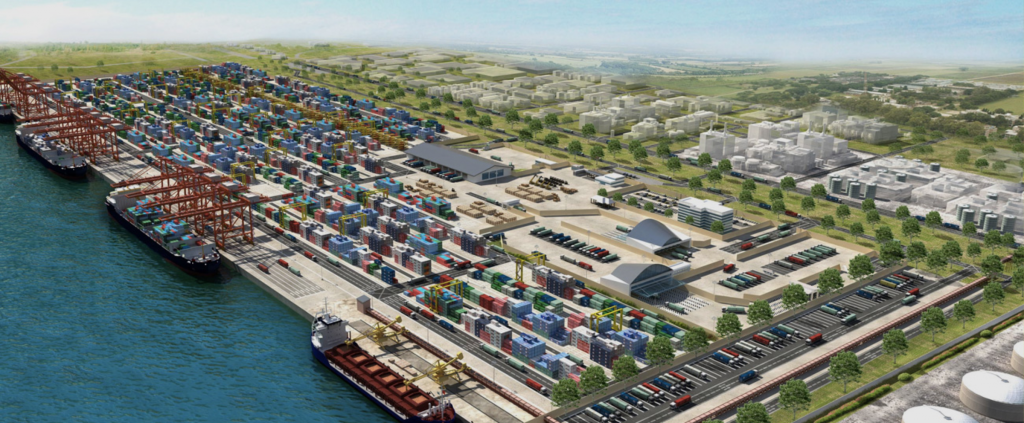
The Lekki Deep Sea Port is over 70% complete
The Lekki Deep Sea Port was over 70% as of late October this year, its promoters have revealed. The project’s construction and development is being undertaken by Lekki Port LFTZ Enterprise Limited (LPLEL), a special purpose vehicle promoted by the Tolaram Group and China Harbour Engineering Company Ltd (CHEC). CHEC injected US$221 million into LPLEL in March 2020 and became the company’s controlling shareholder with 52.5%. The remain shareholders are the Tolaram Group (22.5%), the Lagos State Government (20%) and the Nigerian Ports Authority (5%). LPLEL was awarded the concession for 45 years by the Nigerian Ports Authority (NPA) on a Build, Own, Operate and Transfer (BOOT) basis. Under the agreement, the company is required to develop, finance, build, operate and, at the end of the concession term, transfer the port to the NPA. All major infrastructure components are over 50% complete including land side infrastructure (55.38%), the quay wall (74.13%), the breakwater (74.13%) and the dredging and reclamation works (82.19%). Upon completion, Lekki Port will have a total of 3 container berths, 1 dry bulk berth and 3 liquid berths.
Read more »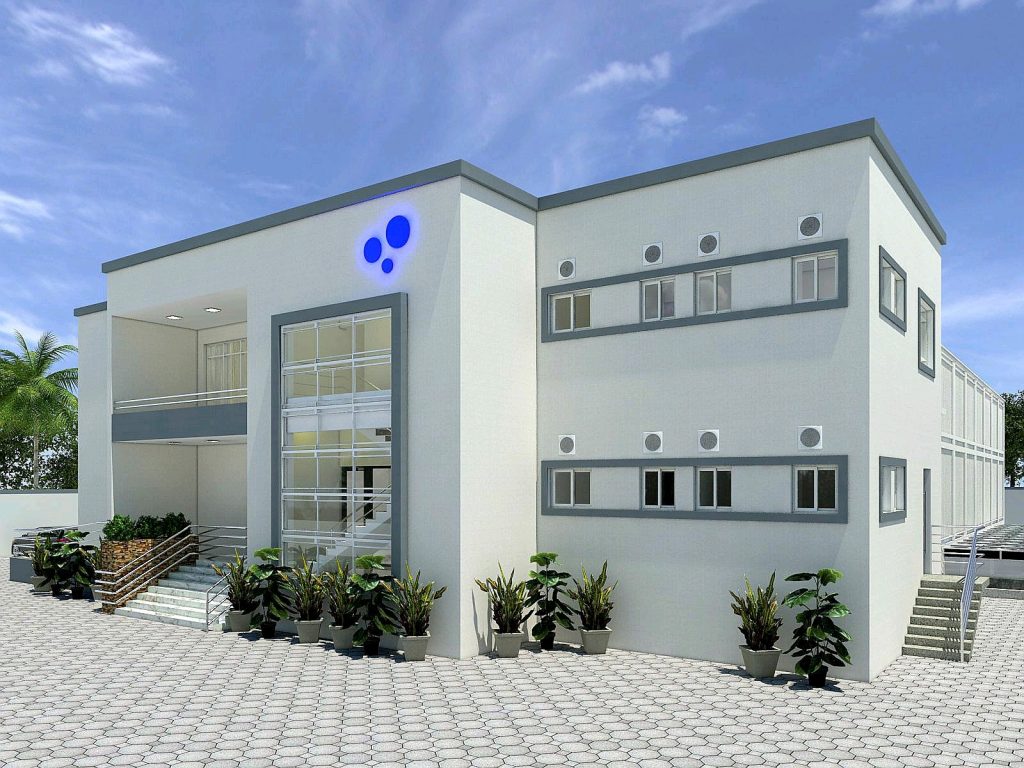
Nigeria’s MDXi to commission expansion of Lekki data center facilities in Q1 2022
West Africa’s leading broadband infrastructure company, MainOne, has announced the start of expansion works at its Lekki data center facilities. Dubbed Lekki II, the new Tier III data center is expected to be achieved in record time and targets commissioning in Q1 next year. It will further grow facilities at the center, initially inaugurated in 2015. Africa’s broadband infrastructure is currently witnessing significant investment and expansion as developers seek to tap into the continent’s growing demographics and needs for better connectivity. MainOne’s subsidiary MDXi had already launched earlier this year its Appolonia Data Center in Ghana
Read more »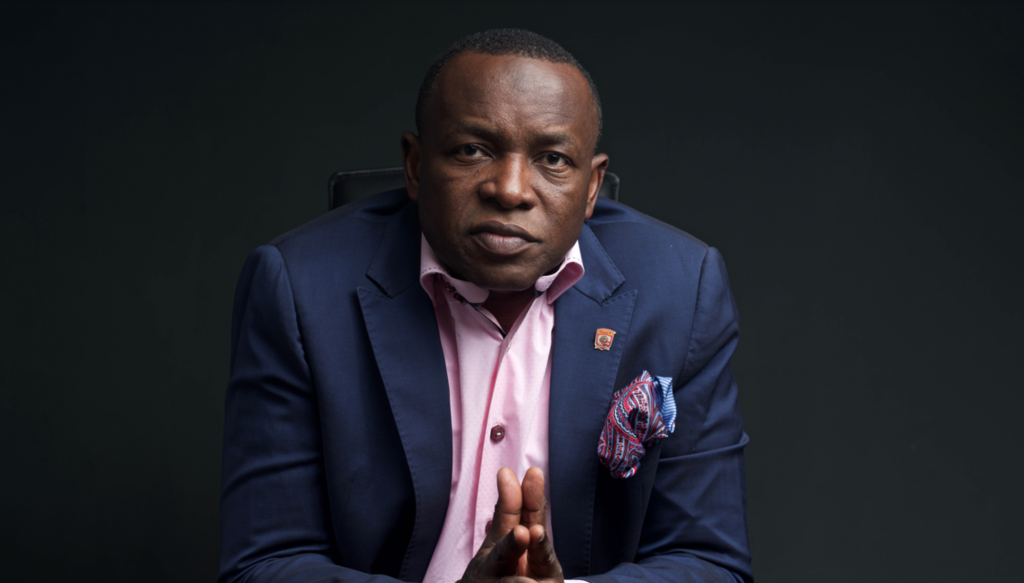
Nigeria’s Sahara Group commits $1bn to LPG vessels and infrastructure in Africa
Nigerian energy infrastructure conglomerate, Sahara Group, has announced an investment of $1bn into Africa’s liquefied petroleum gas (LPG) value chain during the African Refiners and Distribution Association (ARDA) conference 2021 in South Africa this week. “Sahara, through its subsidiary, WAGL Energy Limited is already working towards investing $1 billion to ramp up its LPG fleet and terminal infrastructure over the next five years. In addition to the vessel fleet, Sahara is in the process of building over 120,000 metric tonnes of LPG storage in eleven countries,” he said. In October 2020, Sahara and Côte d’Ivoire’s national oil company PETROCI notably broke ground on a new 12,000 MT LPG storage terminal on the outskirts of Abidjan. The company has also earmarked additional such projects in Nigeria, Senegal, Ghana, Tanzania and Zambia while considering additional investment elsewhere on the continent.
Read more »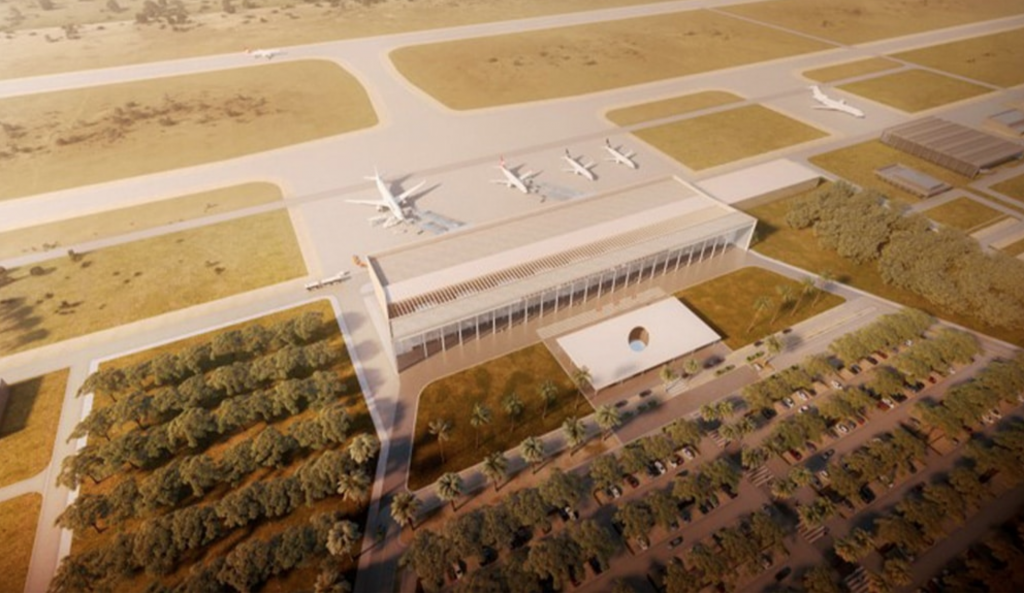
Meridiam signs $250m Concession Agreement for Burkina Faso’s Donsin-Ouagadougou Airport
Earlier today, Meridiam signed a 30-year concession agreement with the State of Burkina Faso for the conception, construction, financing, operation and maintenance of a new international airport 35km northeast of Burkina Faso’s capital Ouagadougou. The project is now progressing towards financing close. The engineering and construction works are expected to start at the end of 2022 and last for about 30 months. Meridiam has partnered with Aéroport Marseille-Provence (AMP) as a technical partner under a technical assistance contract. AMP will also be a minority shareholder in the special purpose vehicle set up for the project. The project is expected to cost about €220m (over $250m) and represents one of Bukina Faso’s biggest public-private partnership (PPP) initiatives. Once completed, the new Donsin international airport will replace the current Ouagadougou-Taamsê International Airport built in the 1960s and located in the centre of Ouagadougou.
Read more »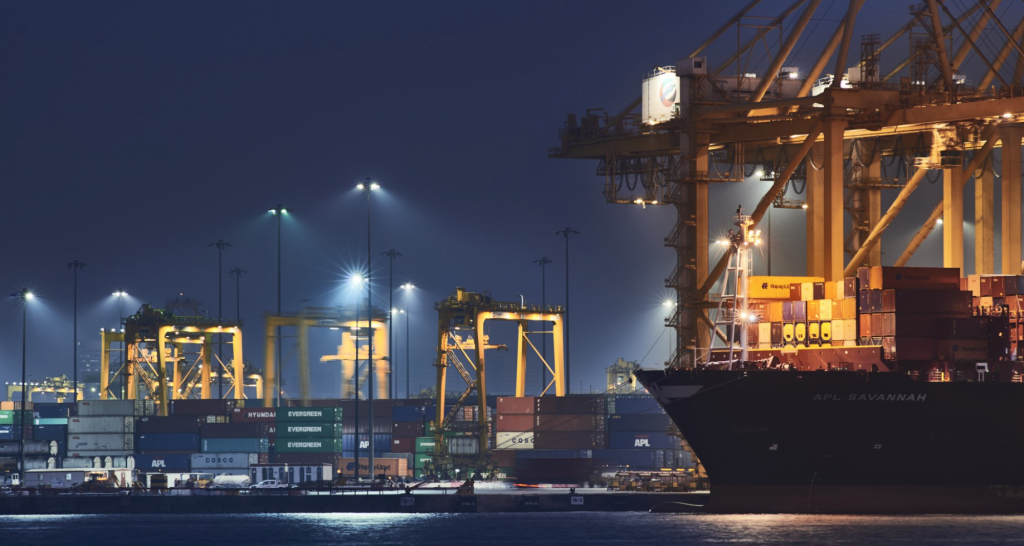
CDC partners DP World for $1.7bn Africa logistics investment platform
The UK’s development finance institution and impact investor CDC Group (CDC) is partnering with DP World of the UAE to invest into Africa’s trade and logistics infrastructure. The long-term partnership will see DP World investing a further $1bn into existing ports in Dakar (Senegal), Sokhna (Egypt) and Berbera (Somaliland). On its side, CDC is initially committing approximately $320 million and expects to invest a further $400 million over the next several years. The additional investment into Berbera aims to turn the port into a regional trading hub boosting economic growth in Somaliland and supporting the growth of Ethiopia by offering an alternative export and import route for the country. In West Africa, the expansion of the Dakar port will be adding capacity as other ports are increasingly being stretched and unable to serve the hinterland. “The port expansion will support trade with landlocked Mali and help Senegal become a hub of economic activity for the region,” CDC explained. The partnership is expected to create 138,000 jobs by investing in origin and destination ports, inland container depots, economic zones and broader logistics infrastructure.
Read more »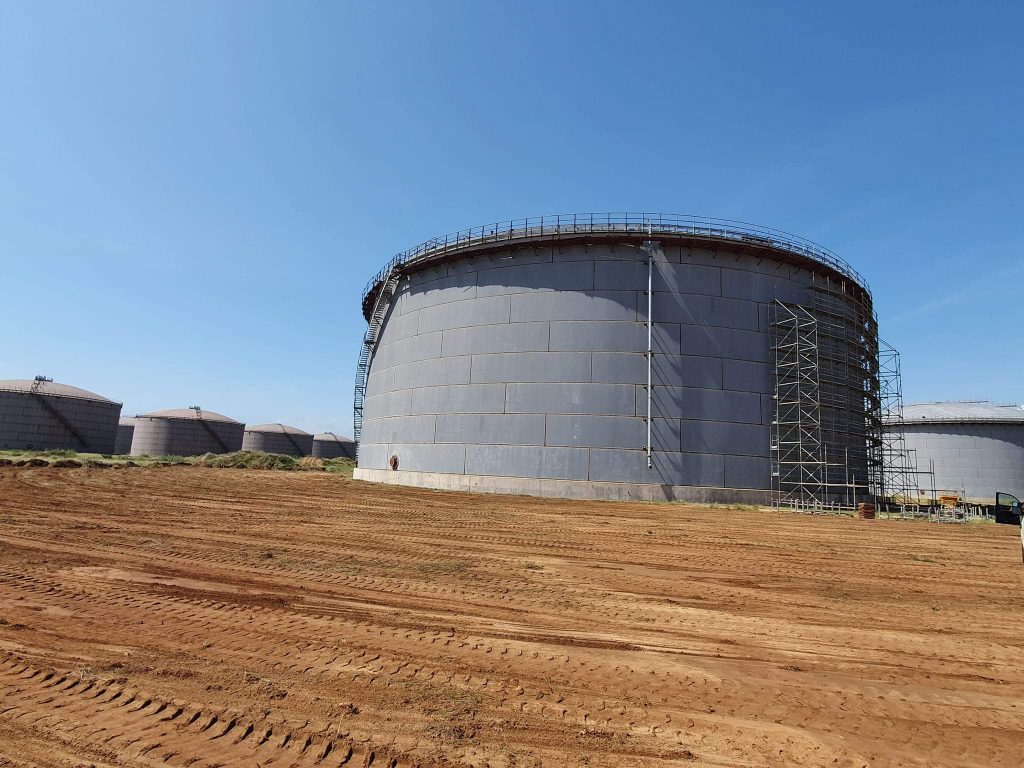
Angola lays first stone for new Barra do Dande Ocean Terminal
Yesterday, Sonangol has officially laid the foundation stone for its landmark Barra do Dande Ocean Terminal (Terminal Oceânico da Barra de Dande, TOBD) in the Bengo Province north of Luanda. The infrastructure project has been in the making since 2013 but delayed several times by years of recession since 2016. It represents a massive step forward for Angola’s downstream sector and aims at turning Barra do Dande into the country’s main platform for the receiving, storage and distribution of petroleum products. Its official launch follows the award of key contracts this month to its EPCC contractor, the Brazilian Odebrecht, along with the supervision contract to DAR Angola and the Environmental Impact Study to SOAPRO. The terminal will be developed in phases and at a cost of $500m (Kz. 317 bn), ultimately targeting the construction and installation of 29 storage tanks connected to maritime infrastructure such as breakwater, berths and unloading lines. Its phase 1 will include 16 tanks with a combined storage capacity of 582,000 m3 of petroleum derivatives including diesel (320,000 m3), gasoline (160,000 m3) and LPG (102,000 m3) reserved for the domestic market, and will support 3,500 jobs during its construction phase. It involves three different units: the first one covers the development of the 16 storage tanks while the second one involves the construction of a petroleum products and LPG pipeline and the third one the construction of two berths with a total capacity of 150,000 DWT. A second phase will add an additional 13 tanks to bring total storage capacity to 782,500 m3 and enable the export of surplus petroleum products. The project fully integrates with Angola’s vision to expand downstream infrastructure. The country is currently expanding its Luanda Refinery while building three new refining facilities with the private sector at Cabinda, Soyo and Lobito. Once commissioned, these will be producing a surplus of petroleum products that can be exported by pipeline or ship to regional and global markets. Upon completion of those brownfield and greenfield projects, Angola will have multiplied its refining capacity by x9 and will be one of sub-Saharan Africa’s biggest refining hubs.
Read more »
AFC creates new asset management division – wants to raise $2bn for African infrastructure
The Africa Finance Corporation (AFC) plans to step up its infrastructure financing in Africa with a new asset management division, AFC Capital Partners. Its debut offering, the Infrastructure Climate Resilient Fund (ICRF) is planning to raise $500m within the next twelve months and $2bn over the next three years. The fund will act as a direct investor and a co-investment fund to support key projects across the continent such as ports, roads, bridges, rail, telecommunications, clean energy, and logistics. The AFC has made it clear that sustainable infrastructure will be at the core of its activities by appointing Ayaan Zeinab Adams as the CEO of AFC Capital Partners. She is the former head of the private sector arm of the Green Climate Fund under the UN Framework Convention on Climate Change, as well as a former CIO and Senior Manager of the World Bank Group’s International Finance Corporation (IFC). Ayaan played a key role in building the mandate of the Green Climate Fund Private Sector Facility and rapidly scaled its portfolio within three years to US$2.1 billion invested across Africa, Asia-Pacific, Latin America, and the Caribbean. She also previously also served as UK-based CDC Group’s Managing Director of Africa Funds.
Read more »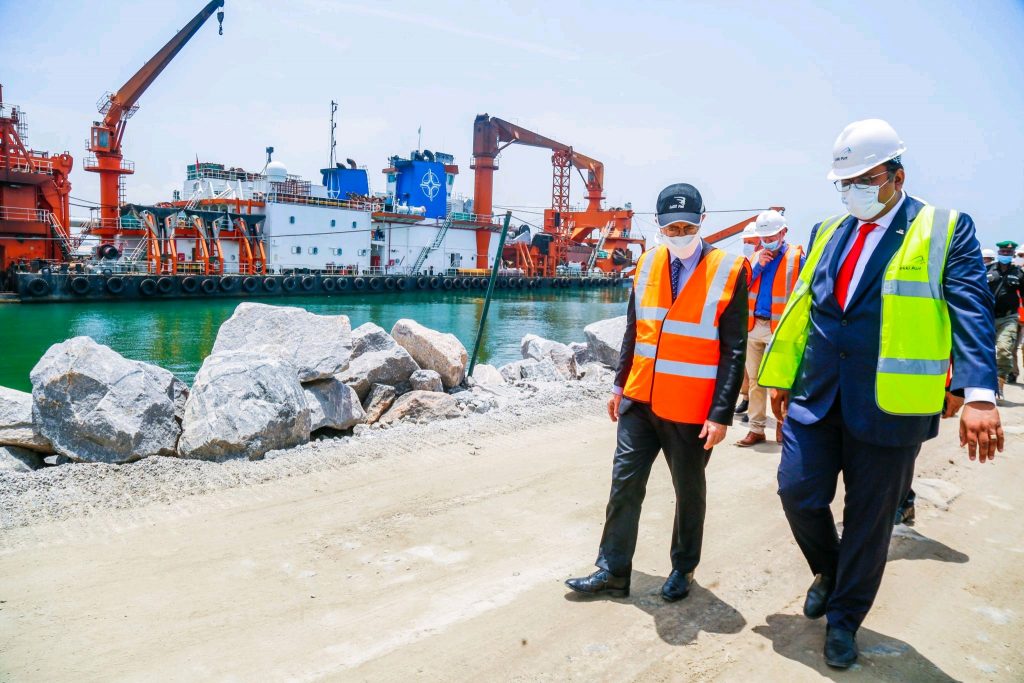
Nigerian institutional investors back bonds issuance from country’s leading free zone
The Lagos Free Zone Co. (LFZC), a subsidiary Singaporean conglomerate Tolaram, has successfully issued a NGN 10.5bn 20-year Series 1 Senior Guaranteed Fixed Rate Corporate Infrastructure Bonds, the company said today. The issuance falls under a NGN 50bn debt issuance programme aimed at securing financing to expand what has become Nigeria’s most modern and integrated free zone, located on the outskirts of Lagos. The Lagos Free Zone is being developed along with the Lekki Deep Sea Port and will be the largest integrated port-based economic zone in Nigeria. It is being developed over 830 ha as part of a $2.1bn investment commitment by Tolaram, of which about half has been invested already. The company is expected to complete the deep sea port in 2022, at the same time when it would lay out a piped gas supply and distribution network to provide energy to its tenants. The port is currently under construction by the China Harbour Engineering Co. (CHEC) and will have its container terminal operated by CMA Terminals. Its Phase 1 development involves 2 container berths and one dry bulk terminal, with a capacity of 1.2 million TEUs and a draught of 16.5m. The bonds issuance announced this week is significant for Nigeria where unlocking domestic institutional capital remains a priority to bridge the infrastructure financing gap. The bond was backed by an irrevocable and unconditional guarantee from InfraCredit and was accorded a ‘AAA’ long term credit rating by Agusto and Co. and GCR, reflecting the highest degree of creditworthiness for these bonds. It was also oversubscribed by institutional investors including eleven domestic pensions funds, two insurance firms, banks and HNIs. “The transaction is the first 20-year non-FGN Bond issue in the Nigerian debt capital market and the first Securities and Exchange Commission approved Infrastructure Bond for the development of an industrial hub” LFZC said in a statement. Source: PenCom The latest data available from Nigeria’s National Pension Commission shows that the country’s pension funds have continued to shy away from investing in infrastructure funds. Despite a YoY growth of pension funds’ investments into infrastructure funds of +23% between July 2020 and July 2021, they still represent only 0.52% of Nigerian pension funds’ overall investment portfolio.
Read more »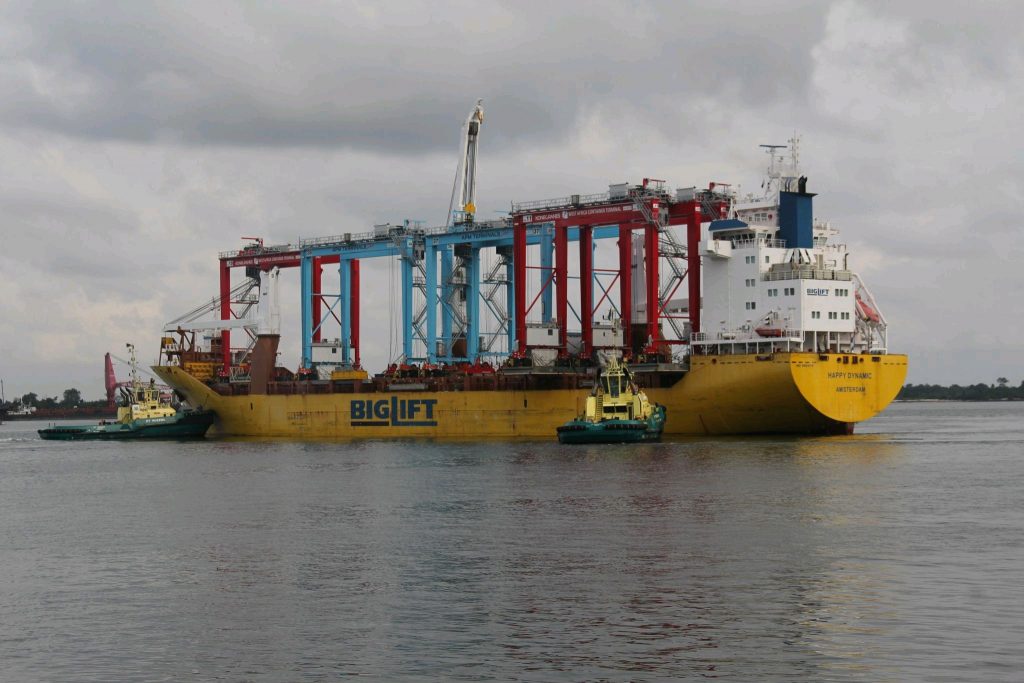
APM Terminals takes delivery of six more RTG cranes for its container terminal in eastern Nigeria
APM Terminals’ West Africa Container Terminal (WACT) in the Onne Oil & Gas Free Zone has taken delivery of six more state-of-the-art Rubber Tyred Gantry Cranes (RTGs), bringing their total number to 14. The new units will further improve service delivery at the Onne Port and confirm WACT as eastern Nigeria’s best-equipped port terminal. In August 2020, WACT had already received the 10,000 TEU Maersk Stadelhorn, the largest containership to evert berth at any Nigerian port. Also last year, APM Terminals had announced further investment of $100m in the terminal’s upgrade Phase 2 including the acquisition of three additional Mobile Harbour Cranes (bringing the total in operation to five), 20 Rubber Tyre Gantry Cranes, three Reach Stackers, 13 terminal trucks and trailers and an empty container handler. The development of WACT started in the mid-2000s in order to open up Nigeria’s eastern market, an under-served region due to its high-risk environment and piracy. The region’s trade infrastructure has considerably increased since then: in addition to WACT, the Philippines’ International Container Terminals Services, Inc. (ICTSI) recently opened the Onne Multipurpose Terminal (OMT) after upgrading and rehabilitating three unused berths at the port.
Read more »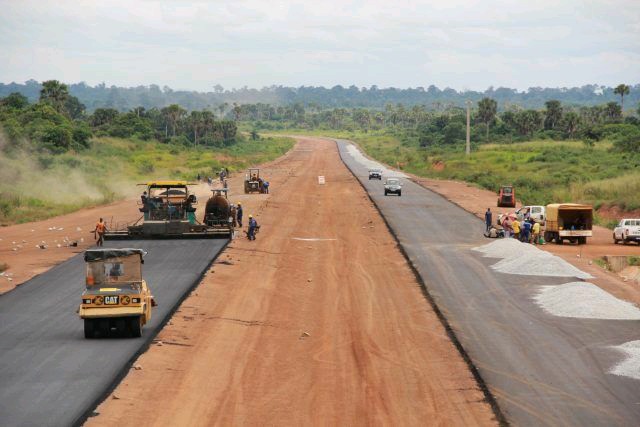
Work has really started at the Trans-Gabon Highway
Officially launched in September 2020, the project of the new Economic Route of Gabon, dubbed “Transgabonaise”, which covers 780 kilometers from the Estuary to Haut-Ogooué, made several steps forward in recent weeks. The coating work was launched last August at PK 56, six kilometers from the base camp that the Minister of Public Works, Léon Armel Bounda Balonzi, visited a few weeks earlier. The first section of the Transgabonaise will stretch 81km and includes the Ebel Abanga-Bifoun axis, presented by users as the “path to hell”. Last May, the Gabon Highway Company (Société autoroutière du Gabon, SAG) informed that the delivery of this first section, which goes from PK24 and PK105 (Nkok and after Kango-Nsilé), will be effective in July 2022. SAG, which is in charge of construction works, had blamed delays on logistics difficulties in the transport of the material and components of the project. Things now seem back to normal, and deadlines can expected to be met. Upon completion, the 828km highway will link Libreville to Franceville and cross six of Gabon’s nine provinces. It will notably establish a strong and reliable connection between the country’s agricultural basins and provide for an efficient logistics corridor for the moving of goods within Gabon.
Read more »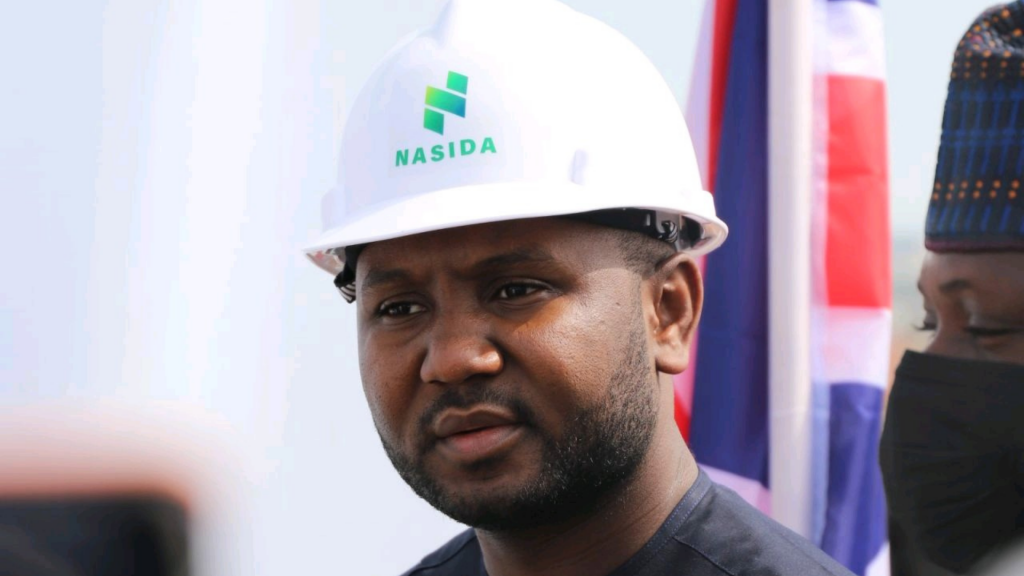
This Nigerian state gets serious about boosting private sector growth
Located just southeast of Nigeria’s capital Abuja, the State of Nasarawa is often overlooked to the benefits of the Federal Capital Territory or bigger industrial states like Kaduna to the north and Kogi to the south. But its government is actively trying to change that and developing new private sector cooperation to boost public infrastructure. In August, its state executive council approved the set-up of five new public-private partnerships (PPPs) to boost development across the state and revitalize its economy. They notably follow the adoption of a new law setting up the Nasarawa Investment & Development Agecy (NASIDA) and concerted efforts to support private sector growth. Chief amongst those projects is the Nasarawa Technology Village in partnership with ABS Blueprint and Modern Shelter. The PPP project integrates housing, technology centers and commercial facilities and echoes a similar venture developed in Abuja, the Abuja Technology Village Science and Technology Park (STP) and Special Economic Zone (SEZ). In transport, the state is pushing ahead with the establishment of the Nasarawa Transport Company to support trade and investment. The initial steps notably rely on the construction of modern bus terminals in various stage of development across the state. Healthcare is another priority with the concession of services offered within the Dalhatu Araf Specialist Hospital in the state capital, Lafia. The operations and maintenance and three key departments within the facility are being given to the private sector, including radiology, laboratory, and mortuary. The Concession Agreement for the Concession of Radiology and Lab Services was signed on September 6th this year with DNA Labs Limited. If successful, this innovative concession model would boost private sector investment in the state’s healthcare system while improving service delivery. Because of their continued fiscal deficits and unstable macroeconomic outlook, most Nigerian states do not qualify to issue sub-national bonds that could support their infrastructure development. As a result, several state governments have been reviewing their legislation to become more competitive and attract private sector investment. The move is seen as encouraging to diversify economic activity beyond Lagos and creating a healthy competition between states.
Read more »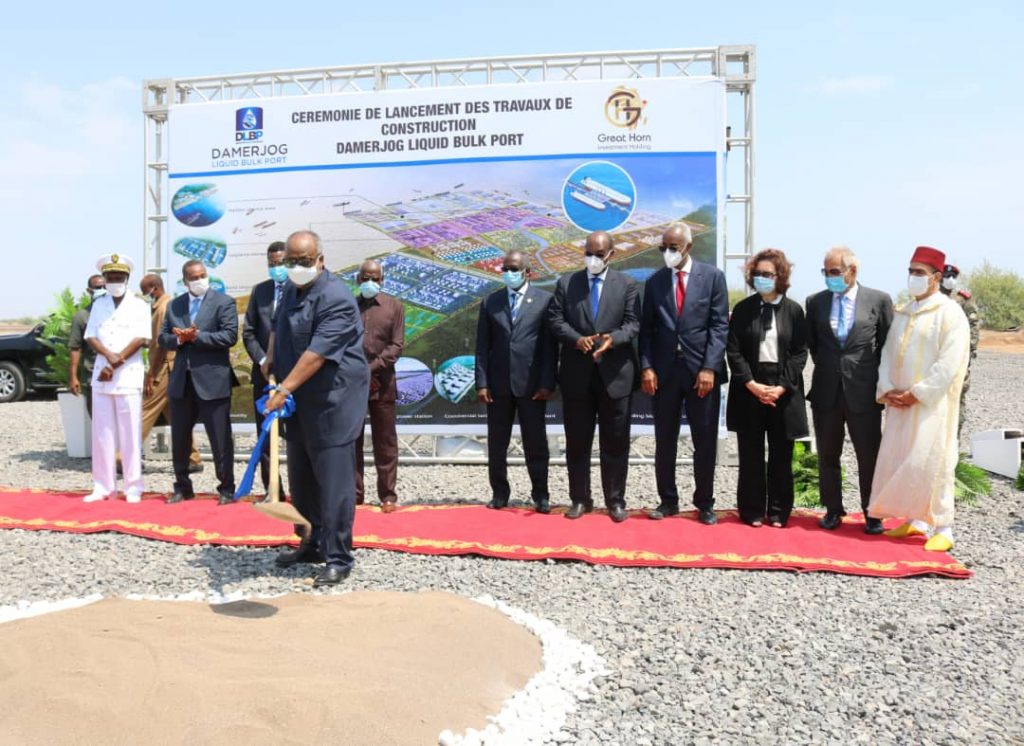
Despite Lack of Natural Resources, Djibouti Attracts Major Investments in Infrastructure
Djibouti has no natural resources, a land area of only 23,200 km2 and a population of 1m. Yet, the country has attracted billions of dollars of investments over the past decade, making some of Africa’s biggest economies look up to it with envy. Foreign investors from China, the Middle East and the United States are injecting billions into the country’s ports, oil & gas terminals, free trade zones and a 750km rail line that serves Ethiopia’s population of over 110m. That railway line alone can carry 2,600 tonnes of wheat and fertilisers and 110 containers per trip. At a time when African countries continue to decry the lack of investment into the continent’s infrastructure, Djibouti is forging ahead and using its geographical location to build the trade and services infrastructure of tomorrow. Geography is the country’s biggest asset: Djibouti is located on the strait of Bab-el-Mandeb on the north-east edge of Africa, where 30% of the world’s shipping passes on its way to the Suez Canal. Coupled with political and economic stability, Djibouti offers investors a safe haven to tap into the world’s most dynamic globalization routes while serving Africa’s growing population. It also helps that its neighbours Eritrea and Somalia continue to be plagued with insecurity and instability. Djibouti’s ports and container terminals remain amongst the most productive in the world. According to a new global container port performance index compiled by the World Bank and IHS Markit, its port is even the most efficient in Africa measured by minutes per container move. With such efficiency, Djibouti’s goal of emulating Singapore as a leading maritime trading hub is within reach. To cement its position as the world’s future big trading hub, Djibouti recently set up a sovereign wealth fund with a view to finance about $1.5bn of domestic business activity over the next decade. In parallel, the country has embarked on significant infrastructure expansion with the Djibouti Damerjog Industrial Development Free Zone, echoing Singapore’s own Jurong petroleum and petrochemicals hub. The industrial park represents a 15-year undertaking and is expected to house integrated energy and petrochemicals facilities and further position the country as a strategic energy and industrial hub meeting the needs of the East African sub-region. While the complex was initially conceptualised to export South Sudanese oil, it eventually developed into a mega industrial and petrochemicals scheme. The ultimate oil complex will cover 80ha, starting with the development of 32ha comprising of 300 000 m3 storage tanks, an oil jetty and railway infrastructure connected to the Nagad Station, and from there to the Djibouti-Addis Abebe railway line. It will also include the construction of a 6 million tonnes refinery by the China Marine Bunker Co. Ltd (CHIMBUSCO) that will refine Saudi and Sudanese crude into marine fuels with a sulphur content of no more than 0.50%S, along with diesel, naphtha and LPG. The facility would primarily meet demand for Djibouti and Ethiopia and be followed by the construction of an onshore refinery. The industrial park will also benefit from a 150MW gas-to-power plant, starting with a 20MW hybrid power station expected to be commissioned in 2022. Such power supply will be key for all upcoming manufacturing units in the park built by Chinese investors and including steel, metal mesh, PVC pipes and glass. The anchor project for the whole complex is the Damerjog Liquid Bulk Port, Djibouti’s seventh port, built by Moroccon contractor SOMAGEC. President of Djibouti Ismaïl Omar Guelleh laid the foundation stone there in September 2020. Details on the Damerjog industrial park and liquid bulk terminal can be found in the “Projects” section within your Hawilti+ research terminal.
Read more »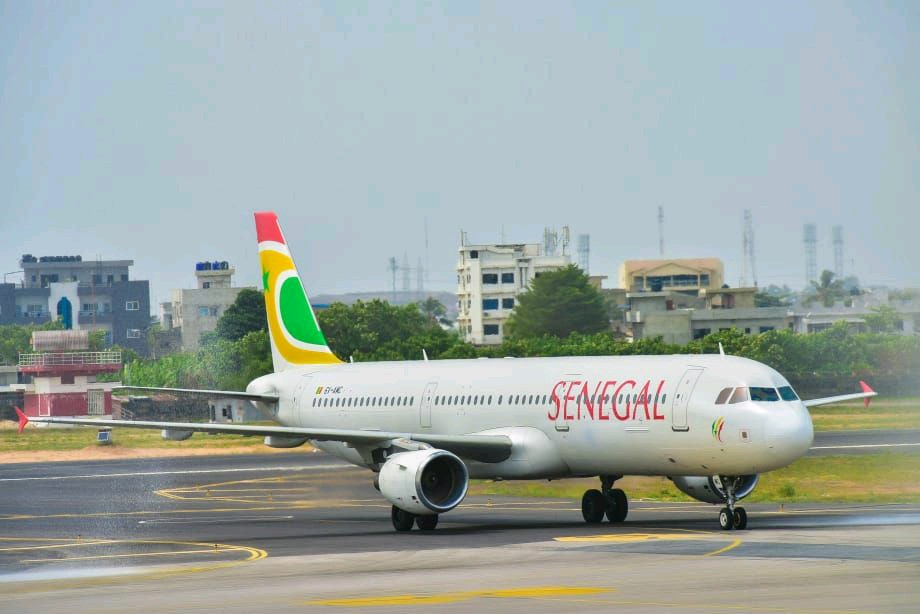
Air Senegal’s Ambition to Rival Ethiopian Airlines Unshaken Despite Covid19 Crisis
The Covid-19 pandemic was an opportunity for President Macky Sall to set the tone for Senegal’s ambitions in the air transport sector. Last year, he set up an economic and social resilience fund of CFAF 50 billion to support Air Senegal and all the aeronautical structures affected by the pandemic and its subsequent lockdown. Thanks to strong state backing, the airline was able to weather the storm better than other regional competitors, and even opened a brand-new connection with the United States in September. An airline that lives up to Senegal’s ambitions For Macky Sall, Air Senegal is an essential pillar of the Plan Senegal Emergent (PSE), an ambitious development strategy supporting key projects and infrastructure development over the 2014-2023 period. Launched with an initial capital of 40 billion FCFA (61 million euros) mobilised by the State of Senegal, the flagship company started its commercial operations on May 14, 2018, with the ambition of becoming an enabler for tourism an economic development while further opening up Senegal to the world. “I dream of a company which will be in 20 years the alter ego of Ethiopian Airlines which is a success for Ethiopia”, Macky Sall declared last August, recognising the strong resilience of the Ethiopian company since the start of the global health crisis. Born from the ashes of the defunct Senegal Airlines (2016), the launch of Air Senegal responds to a rigorous and coherent approach based on rational strategic planning by Senegal, its President suggested. “I personally and particularly monitor the development of Air Senegal, one or two days do not go by without me calling the Director General or the Minister […] because I want it to be a success and it is possible. “ Only 3 years after its launch, Air Senegal is obviously well on its way to supporting President Macky Sall’s ambition to make Dakar a hub. The company is staying the course and does not hide its ambitions for growth. Amid the health crisis, Air Senegal continues to expand its service network. It is in fact one of the fastest growing African companies in recent years. Since February, the carrier has opened six new routes: Lyon, Milan, Douala, Libreville, Cotonou and Freetown. Its service map now includes around fifteen cities in fourteen countries in Africa and Europe. But Air Senegal has not stopped there. On September 2nd, the company opened its first trans-Atlantic route to New York and Washington in the United States. It estimates that approximately 42,224 passengers will be carried in the first year of service. To support its growth plan, the government has relied on a modern fleet. Air Senegal expects the first of its eight Airbus A220-300s on order by the end of the year. These are flexible and responsive carrier that will allow operation “with 25% less fuel costs and 17% less maintenance costs,” said Managing Director Ibrahima Kane. The company currently operates 8 aircraft, including two Airbus A330-900neo. It is the first operator of such a carrier in Africa. Brand new infrastructure But the creation of the national company is not an isolated venture. It fits into a broader scheme seeking to democratize air transport across the country, in accordance with the objectives of the PES. Such vision supported the commissioning in December 2017 of Dakar Blaise Diagne International Airport (AIBD), an ultra-modern platform that become the main gateway to Senegal. It has a handling capacity of 3 million passengers, expandable to 10 million. In 2019, it handled a record 2.5 million passengers, making it into the top 5 busiest hubs in West Africa. AIBD is based on a large land reserve offering the possibility of building a second airstrip when needed. But the success of Air Senegal and of Senegal’s aviation hub plan inevitably depends on the local training of human resources and the domestication of maintenance tasks. “Whenever a company is forced to look for expatriates, pilots or mechanics, a maintenance center elsewhere than at home, it has little chance of being profitable”, Ibrahima Kane insisted, stressing that Air Senegal needs 120 pilots within 3 years. In December, the company signed a memorandum of understanding with AIBD SA for the establishment of a partnership and cooperation framework for the construction of an aeronautical maintenance center at a cost of around 56 billion FCFA (85 million euros). Earlier this month, Air Senegal launched the recruitment campaign for its very first class of cadet pilots and aircraft maintenance technicians. Successful candidates will be trained at the International Academy of Civil Aviation Trades (AIMAC), the new benchmark school set up by Air Senegal in collaboration with the Senegalese Air Force. At the end of a 2-year training course, they will join the airline as airline pilot officers and aeronautical maintenance technicians. Ultimately, Senegal is also aware that the attractiveness of the country – which targets 3 million tourists per year – depends on the development of poles around the seaside, cultural, eco-tourism, ad business sectors. One of the key target of the PSE, in its “infrastructure” section includes the modernization of 13 regional airports for a budget of over 210 million euros.
Read more »